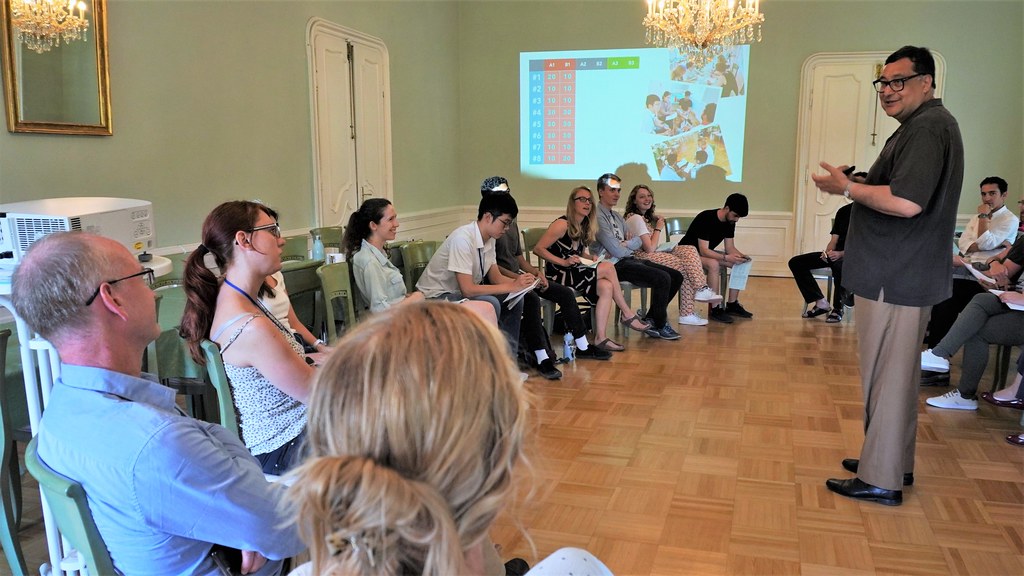
Influencing science policy and its outcomes continues to pose many challenges for scientists. In his recent half-day workshop at IIASA, acclaimed policy expert, incoming president of the World Wide Fund for Nature (WWF), and inaugural Peter de Jánosi Visiting Fellow at IIASA, Adil Najam, engaged participants of the 2023 IIASA Young Scientists Summer Program (YSSP) in a lively discussion and simulation on negotiating science policy.
Having participated in multiple international negotiations including the United Nations Framework Convention on Climate Change (UNFCC), Adil Najam is fully aware of the crucial role negotiation plays in arriving at good science policy decisions. In fact, he insists that “negotiation is among the most common means of decision making at all levels – from personal to national to international.” However, real-life negotiation processes are often hard to navigate due to the high level of complexity and dynamics. This is why he thinks a systems analysis lens should be applied to negotiation for better science-policy decisions.
In his latest visit to IIASA, Najam shared valuable insights on the art of negotiating science policy with participants of the 2023 Young Scientists Summer Program (YSSP). The half-day workshop was “minimal lecture with maximal engagement”, as described by Nadine-Cyra Freistetter, one of the YSSP participants who took part in the event.
To illustrate how negotiation is carried out in a real-life situation, Najam engaged participants in a prisoner's dilemma game. Developed in 1950 during the Cold War, the game is commonly used to show how little each decision maker would accomplish in a group by making choices that only serve their own purposes.
By letting participants experience the scenario firsthand, Najam demonstrated the many challenges faced in international negotiations, particularly when it comes to complex, global issues such as climate change. In the discussion that followed, he helped the participating YSSPers to identify multiple aspects that could contribute to the success or failure of a negotiation process.
The workshop has left very positive impressions among the 2023 YSSP group.
“A very thought-provoking, enriching and hands-on workshop that left me inspired and eager to learn more about negotiation and science for policy.”
María Castro Cadenas, Biodiversity and Natural Resources Program
“Adil Najam's workshop brilliantly highlighted the intersection of science, policy, and negotiation. It was fun but thought-provoking too, compelling me to further explore and consider training in science policy.”
Ehsan Pashanejad Silab, Advancing System Analysis Program
"The workshop was very inspiring as it allowed us to deep dive into the techniques and tactics of negotiation skills. The interactive setting offered practical learnings and open exchange both among participants and with the instructor. In particular, understanding the motives behind each round of the exercise was very helpful to improve cooperation initiatives.”
Carmen Séra, Energy, Climate, and Environment Program
"The simple yet thought-provoking exercise where we teamed up to play a variant of the classic prisoner's dilemma experiment was the highlight of the workshop for me. It opens up a whole new way of thinking about tradeoffs to account for during negotiations – whether it's a simple personal decision or a more complex policy relevant scenario. Dr Adil was great at driving home the importance of building trust during negotiations."
Jalal Awan, Advancing System Analysis Program
“The workshop presented a great opportunity to critically evaluate the science-policy sphere and many of the challenges that come with effective communication and negotiation. I found the 'prisoners dilemma' game particularly helpful to highlight the challenges in building trust within a negotiation.”
Rebekah Hinton, Biodiversity and Natural Resources Program
Najam is a YSSP alumnus himself and now the first holder of the Peter de Jánosi Visiting Fellowship, which is supported by the US-based Friends of IIASA. He was a coauthor of the Third and Fourth Assessments of the Intergovernmental Panel on Climate Change (IPCC). He currently serves as the inaugural Dean Emeritus at the Frederick S. Pardee School of Global Studies at Boston University in the US and as a Professor of International Relations and of Earth and Environment at the same institution. He will start his presidency of WWF International in July 2023.
News

23 July 2024
Introducing the IIASA Justice Framework

16 July 2024
Mapping global rooftop growth for sustainable energy and urban planning

08 March 2024
